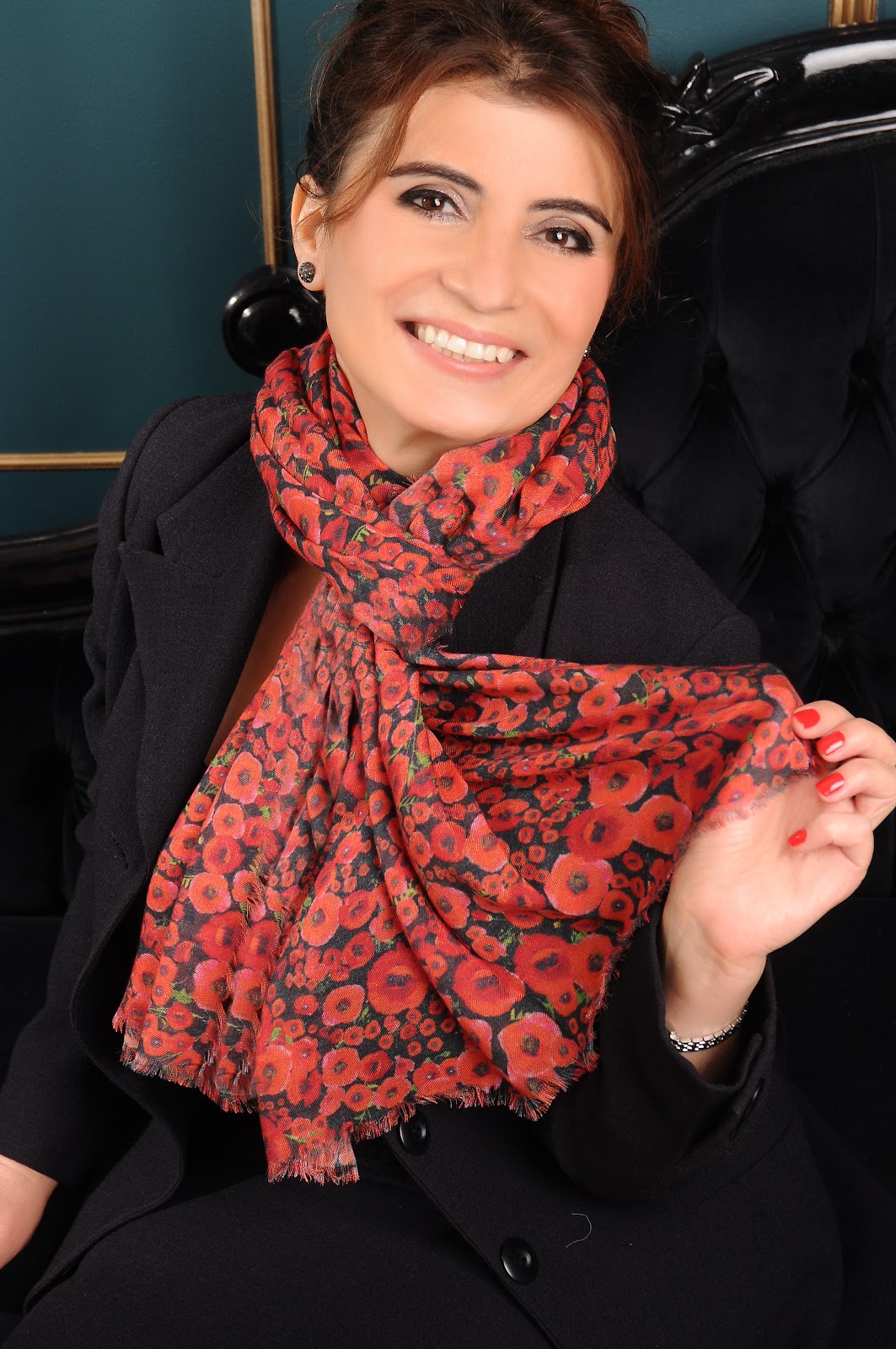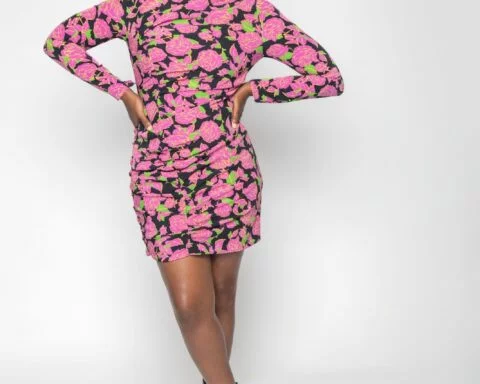Blooms of London Ltd is a fashion manufacturing and retail company that creates unique and attractive designs inspired by nature and wildlife.
These distinctive designs are applied to fashion accessories such as umbrellas, ties, scarves, and handbags and sold to the wholesale market and direct to customers.
The company’s brand value is to make chic, high-quality and distinctive products for all occasions at an affordable price for customers.
Founder’s/Owner’s story and what motivated them to start the business
Building a new fashion brand in an already competitive and crowded marketplace is not easy. It’s even more difficult when the world is trying to come to terms with a damaging financial crash and global recession.

This was the landscape that economics graduate, Yasemin Guzeler, the founder and creative director of the designs at Blooms of London Ltd, found herself in during the late noughties.
The fact that just over a decade later, her brand is easily recognisable on the high street is a testament to her passion. “I always took an interest in art and design and I think my creativity is heredetory, as my grandfather was a fine furniture maker, and my mother was a designer specialising in floral stitching design on quilt covers as well as an artficical flower designer.”
While finding a strong niche in the fashion industry is not easy, you also need to match that with a clear ambition, tenacity and a good deal of personal drive. The Blooms of London story started on a chilly Christmas evening in 2008, when Yasemin joined some friends at Brown’s Restaurant in Mayfair, London.

At the time, she was working as an accountant, a career she had followed since graduating, contracting out her services to various law firms in London. Talking to her friends in the restaurant, she noticed a woman walking in, wearing a long dark coat and colourful tartan/tweed handbag.
Always blessed with an eye for fashion, Yasemin liked the way the bag complimented the dark winter outfit and made a mental note to ask the woman where she had bought it.
“But after a few glasses of Rose, I forgot,” Yasemin recalls. “By the time I remembered again, she had left the restaurant. I thought I could find the same bag through an internet search. I spent days and days looking and was very frustrated I couldn’t find it. The ones online were either cheap and not so nice looking retailing at around £30 or they were really expensive designer products over £350.”
While her search online was unsuccessful, it did seed a germ of a business idea in Yasemin’s head. She suddenly realised that there was a gap in the market for quality but still affordable tartan and tween handbags that were made with genuine leather.
“Having worked in a fashion company in the past I could appreciate the quality of British produced fabrics and I was surprised there were not more companies using these beautiful materials to make handbags.”

Indeed, there only seemed to be one outlet making quality handbags in genuine leather in that mid-price range she was looking for, but they were not producing a huge variety. With her background in fashion and design, Yasemin spent her free time working during the day at her main job producing her first samples.
She started selling these to friends and colleagues she worked with at the time. “Initially I had no idea who to market these handbags to and was also ringing people randomly and approaching some fabric producers and shops to see if they were interested in selling my products.”
One day she received a call from the managing director of fabric manufacturer MacNaughton Holding Ltd. Blair MacNaughton told her he couldn’t make an order but that he loved her idea and was calling to give her some advice.
“We spent nearly 40 mins chatting over the phone, for which I was immensely grateful. Blair advised me who my potential customers should be and ended up telling me that I should drop everything and participate in Scotland Trade Fair in SECC Glasgow which was taking place the next month.”

The Scotland Trade Fair brings together around 200 companies each year where thousands of products are exhibited and orders placed by brands and stores in the lead-up to Christmas. Despite the short notice and her inexperience, Yasemin gathered together a few samples and headed to the trade fair. She was pleasantly surprised by the amount of interest there was in her handbags and the orders she received.
“Then the following year I participated in the trade fair more professionally and better prepared. I expanded my handbag collection from 4 to 20 and I had 60 companies interested. So many of them finally made orders, I was overwhelmed with joy.”
The business doubled its turnover in the next 3 years but it wasn’t all plain sailing for Yasemin. One of her biggest customers visited her at the trade fair one year and said her handbags had become one of their most popular ranges. They wanted to put in a big order if Yasemin could offer a good discount. She did so and waited for the order to come in but it didn’t go any further forward.
“After that exhibition, I noticed our orders had dropped significantly from quite of my few regular customers. I thought there was something strange going on and so I checked my customer’s website – the one who was so keen to make a big order. I noticed that our bestselling handbags had been copied, made with fake leather and were being sold at a much lower price.”
This was a big blow and left her feeling extremely disheartened. It’s a testament to her determination that Yasemin did not let this pull her off track, however. So many small and medium-sized businesses fail because of challenges such as these that can often seem insurmountable at the time.

Perhaps because most of her first customers were Scottish, Yasemin decided to rebrand her handbag designs and included a simple thistle print on them. When she took the new design to a trade exhibition in Paris, it grabbed a lot of attention from professional buyers. It was then that she decided to expand into her own floral prints, creating unique and eye-catching designs that were going to be more difficult to copy.
“I put together a new collection and launched it at Maison & Objet in Paris shortly after. I was very happy with the amount of interest and orders from International buyers at this first show and from then on I was continuously expanding the range and found new customers from all around the world.”
Her initial brand was confined to a much smaller market that sold mostly in Scottish stores with a few specialist international shops on her list of customers. The second brand, with its unique floral designs, reached a much wider audience.
“My second brand opened the door for me to the world. Although my experience of the products being copied was bad, something positive came out that which was Blooms of London. We don’t look back now and we are busy constantly developing new designs. Each year our customers are looking for something new!”
Today, Blooms of London has its own website, selling directly to the public as well as access to a wholesale market through trade fairs. What drives Yasemin on? It’s not the financial gain or the successful business but the joy that she sees on the faces of those who buy her products.
The challenges the business is facing
Being a relatively small fish in a big pond will always mean there are challenges. There is still a big risk of being copied, particularly by larger companies and the fashion industry is always going to be a cutthroat business.
For Yasemin, Blooms of London must constantly do all it can to protect its designs and products while remaining competitive and targeting the right customers. Marketing can be a challenge and getting noticed on the world stage has become more complex and expensive over the last ten years.
The financial pressures and remaining competitive in the fashion sector are difficult at the moment, as they are for many industries.
“In recent years the market has become very volatile which makes long-term planning hard,” explains Yasemin. “The rising cost of living and inflation amounts to a double challenge. On the one side, the cost of production and shipping has become more expensive due to disrupted supply chains, on the other, there is more pressure to produce items with more competitive prices as most household budgets are squeezed.”
Brexit has also played a big role and made it more difficult and expensive for UK companies to export their products to EU countries. There is still a lot of confusion over duties, taxes and shipping methods as well as customs. The pandemic hasn’t made things any easier for a business that was just beginning to flourish before the lockdowns of the last few years.

The opportunities the business is facing
Despite the financial pressures, Yasemin remains optimistic and focused on taking Blooms of London from strength to strength in the future.
“We are in an ever-changing world and the market constantly offers new opportunities. If you want something and you cannot quite get it or find it, that is very likely is a business opportunity. It’s worth pursuing.”
This philosophy is what defines Yasemin as a business owner. It’s important to not get stuck in the same old processes and products and hope that these will be there forever. Change is good and looking for opportunities and new approaches is key to business success.
Advice to others about business
Yasemin has learned a lot over the last decade or so about running a business in a competitive sector and the future looks bright despite the worrying economic challenges the world is facing at the moment.
Networking has been a key part of her success story. It’s important to partner with like-minded individuals who can help guide you through difficult challenges and be there as a sounding board.
Partnering with a larger, established company that isn’t a competitor can be a great move for a burgeoning business. Not only will they give you support, but you can learn an awful lot about how they approach the industry. Building relationships with trusted peers is also important, whatever industry or sector they work in – it’s a great option for getting second opinions, especially when things get complicated.
Keeping track of your financial situation is also important, according to Yasemin. “Looking after your cash flow is really key. See it as the petrol in your car – if you have enough you will reach your destination. It’s vital to focus on revenue and value and have a balanced approach.”
In any business, it’s important to embrace change and not run away from it. Change can be challenging but it can also be good. The fashion and retail sector has gone through enormous changes over the last twenty years. It’s part of the landscape businesses occupy. Always see change as a new opportunity and learn to adapt.
Yasemin has these top tips for budding entrepreneurs and new startups:
- One of the key factors in success is how you look after your customers and the relationship that you build with them. The more direct you can be and the more you can get to know them the better.
- It’s essential to stand out from the crowd, especially in a highly competitive sector like fashion. You need to find what makes you unique and sets you apart from your competitors. Anyone can do any job, but no one can be you!
- Professionalism and trust are at the core of any successful business. There’s the adage that people buy from people and both your customers and people who supply you with services must see you in a positive light. Being greedy or trying to cut corners to improve your profits can damage your relationship with customers and be catastrophic for your brand.
- Your product is the thing that defines you and it’s critical to make this the best it can be, even if you are working on a limited budget.
There are also some personal bits of advice from Yasemin about how you should conduct yourself as a business owner.
“Time can be a huge challenge for any entrepreneur, especially when they are first starting up a business, whatever sector it is in. Setting both short and long-term goals is essential and prioritising your time needs to be ingrained – something you do naturally and always work at to improve.”
Complacency can be a big drag on potential success. If you let things slide and don’t take action, you can end up falling behind or not spotting the next step in the evolution of your business. You can’t rest on your laurels, at least not for long. “You need to identify opportunities quickly, develop new approaches and adapt. Having a philosophy of being a life-long learner helps. It means you are constantly exploring options, developing skills and progressing.”
Finally, a business owner needs to maintain a good work and life balance. That doesn’t just mean keeping fit and healthy but taking the time to enjoy not just your successes but those of the people around you who are closest.
- FDC – Giejo Magazine Article - July 29, 2023
- MoriMa Tea the – Chinese tea culture - April 26, 2023
- Missionary Position – Least Likely To Bring You To Climax - April 7, 2023






